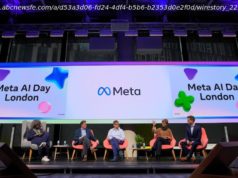Data and technology could allow Amazon to predict what shoppers want to buy from Whole Foods.
Whole Foods customers are one step closer to being able to ask Alexa to order their groceries.
Whole Foods shareholders voted Wednesday to approve Amazon’s acquisition bid, and Amazon announced Thursday it would close the deal Monday.
But what if you didn’t have to tell Alexa what you wanted? What if instead, she told you? That may sound like a sci-fi fantasy, but it could become reality.
Amazon announced Thursday it would integrate its Prime program into Whole Foods stores in the future and make it the grocers’ loyalty program. The company said the goal is to lower prices at the notoriously expensive store, but the move also gives Amazon insight into people’s shopping habits.
It’s no secret that Amazon already uses data to personalize people’s experiences. The website is loaded with recommendations based on previously viewed or purchased items. It also features virtual dash buttons that allow shoppers to simply click a button to restock on a previously purchased item.
Amazon could even implement more radical features using its voice-activated Alexa technology, such as prompting shoppers to buy products. Grocery shopping could be a promising introduction. It provides predictable data because customers are inclined to buy the same perishable products like milk and bread on a consistent schedule.
“Now a customer is proactively placing an order, and you can say, ‘We’ve seen you place an order for milk every week in the last 7 weeks, and now in this case, why don’t we proactively prompt that?” said Amit Sharma, CEO of Narvar, a software company that helps retailers improve customers’ post-purchase experience.
Amazon already has access to troves of consumer data. People can buy everything from books to furniture on its website. However, Amazon has one blind spot: grocery, said Mikey Vu, a partner at Bain & Company.
Jeff Bezos has struggled to disrupt the grocery industry like he has disrupted others. The bulk of Americans still prefer to buy their food at traditional brick-and-mortar stores. Buying Whole Foods could pry open a trove of consumer insight and data that Amazon has not been able to access on its own.
“A whole world of data has opened up to (Amazon) because their purchase of Whole Foods gives them a lot of interesting opportunities to figure out what you’re buying, how you buy it and what you’re going to need next, ” Vu said.
By 2025, customers at Kroger could be able to order groceries on an app while they eat and have a store clerk deliver them, Kroger CEO Rodney McMullen told The Wall Street Journal in an interview published this week. It will be “so easy” because Kroger will be able to predict what customers want, he said.
Wal-Mart also is working toward a similar goal. Earlier this week, it announced a partnership with Google that will allow Wal-Mart shoppers to link their accounts to Google Express and order through voice on Google Home or by shopping on Google Express. The end result will mean Google will eventually learn customers’ purchase patterns.
These are only the beginnings of predictive grocery shopping.
If Amazon and Whole Foods could integrate data from sources such as social media, they could help recommend even more products, Vu said. For example, if a customer is eyeing recipes on Pinterest, Whole Foods could suggest ingredients that you could use to make them or other related products, like cookware or serving dishes.
“This is like your personal concierge. These things are happening slowly already, ” said Sharma, who was an executive at Wal-Mart, Williams-Sonoma and Apple before founding Narvar. “Based on marketing emails, they’re already doing bits and pieces of that now by pulling all of your data, and continued innovation in cloud computing makes it faster and cheaper.”
Of course, no one on the outside ever really knows what Amazon is planning. Its announcement that it was buying Whole Foods was enough to shock the business world.
Amazon teased some plans Thursday, but it did not divulge how long it would take to complete the integration of the point-of-sale system in Whole Foods stores that would unlock additional savings for Prime members.
“This is just the beginning — Amazon and Whole Foods Market plan to offer more in-store benefits and lower prices for customers over time as the two companies integrate logistics and point-of-sale and merchandising systems, ” the company said in a statement.
Aside from that, the world will have to wait to see exactly how Amazon will use its new toy.






